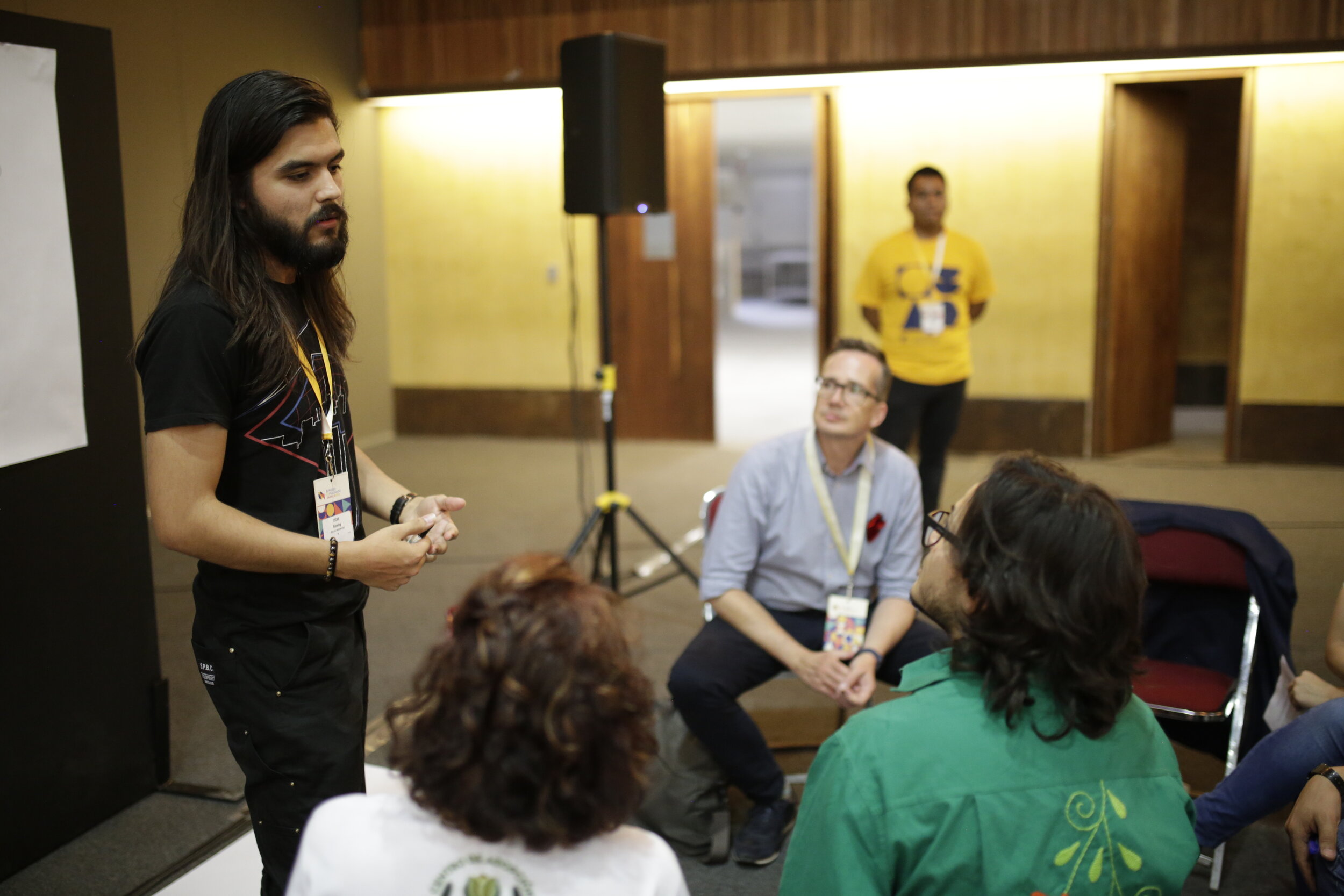“Gender Order: Reconfiguring Museum Strategies”
2019. Reimagining the Museum Conference, Oaxaca, Mexico.
Co-designed by Kathleen McLean and Barbara Henry, this participatory workshop encouraged attendees to select a potential scenario focused on gender discrimination in museums, work together with other participants to deconstruct the issues embedded in the scenario, and develop a strategy for action.
“Planning for Climate Stories”
2019. San Francisco State University Global Museum
Working with Museum Director Paige Bardolph and SFSU students, Kathleen McLean helped create a conceptual framework for identifying stories about the impacts of climate change on people’s lives today. The kick-off workshop sought to capture a wide range of potential topics that could be paired with objects from the museum’s collection.
“Prototyping as a Conceptual and Design Tool for Renovating Museum Galleries”
2019. The Delaware Museum of Art.
As part of a large museum-wide initiative to reconceive and redesign many of the museum’s collections galleries, this workshop provided an overview and hands-on practice of incorporating prototyping into the exhibition development process. Staff selected key galleries in which to begin this work, and then created paper “interventions” in the existing galleries. Participants included key exhibition and interpretation staff. After the workshop, staff developed an action plan for incorporating the prototyping findings into the gallery redesign process.
“Gallery Review and Experimenting with Prototype Interventions”
2018. Museo Universitário Universidad de Antioquia (MUUA), Medellin, Colombia.
Workshop participants included MUUA staff as well as staff from other Medellin museums. We reviewed the recent reinstallation work in one refurbished gallery, and added prototype notes to developers, as well as prototyped new ideas for their older natural sciences gallery, which was in need of refurbishment.
“Rapid Prototyping for Exhibitions”
2017. Reimagining the Museum Conference, Parque Explora, Medellin, Colombia.
Using an existing exhibition at Parque Explora—“En Escena” or “On Stage”— participants reviewed the entire exhibition gallery, selected individual exhibit components or sections within the gallery, and worked in teams to redesign and improve the installations. The workshop wrapped up with a review and discussion of the potential effectiveness of the prototype interventions.
“Museum Prototyping: Creating More Engaging Exhibitions with a Different Kind of Evaluation Process”
2106. Nacional de Conservación, Restauración, y Museografia (ENCRyM), Mexico City, Mexico.
In this workshop, we explored the notion of prototyping as an informal evaluation process, as well as a tool for more innovative exhibition planning. Museum studies students worked collaboratively in groups to create prototype exhibits that were used as a focus for conversation and dialogue around visitor experience issues.
“Experimenting with New Processes for Creating Exhibitions”
2016. The National Museum of Colombia, Bogota, Colombia.
This two-day workshop with museum staff, including the Executive Director, was part of an overall museum transformation of the processes of exhibition idea development, design, and installation. We began with an overview of a variety of prototyping techniques in museums around the world, and then focused on one gallery space that was slated for redevelopment. Staff worked in small collaborative groups to create new exhibit ideas and to retrofit and redesign older exhibits. Following this workshop, a variety of new and experimental exhibitions were created by staff throughout the museum, using many of the techniques we employed in the workshop.
“Critiquing Papalote’s My Body Zone Exhibition”
2016. The Association of Mexican Museums and Science Centers Annual Conference, Mexico City.
This half-day workshop focused on an exhibition at Papalote Children’s Museum that was considered unsuccessful by museum staff. The first part of the workshop included a formal walkthrough of the exhibition, and discussion of design, affordances, and interpretation. Then participants worked in the gallery to create prototype interventions that could potentially improve the exhibition and the types of experiences available for visitors.
“Prototyping as Exhibition Design”
2015. The Asian Art Museum, San Francisco, California.
In this one-day professional development workshop, staff participants selected exhibit sections within their permanent galleries and developed prototypes designed to improve visitor experiences. After the workshop, museum staff created a prototyping process that was specifically suited to their museum culture, integrating it into the museum’s major redesign and reinstallation initiative.
“An Experiment in Prototyping”
2015. The Philadelphia Museum of Art, Philadelphia, Pennsylvania.
As part of the PMA’s reinstallation of a number of its permanent galleries, this workshop introduced to staff the process of prototyping and incorporating visitor feedback and questions into gallery conceptualization and design. A particular focus of this work was in the South Asian Gallery , where staff tested out a number of interpretation strategies during redesign and reinstallation.
“Innovation in Exhibition Development and Interpretation.”
2013. The Royal Ontario Museum, Toronto, Canada.
A major change initiative at ROM included staff examination of new approaches and practices for exhibition development, design, and interpretation. This set of workshops provided tools (and practice) for critiquing existing exhibitions and prototyping new ideas in the galleries. Workshops were designed for mid-level exhibit staff, as well as frontline, marketing, and interpretation staff. An additional daylong workshop and prototyping session in the galleries was specifically created for all senior staff at the museum, including the Executive Director.
“Prototyping Participatory Experiences”
2013. For the Denver Evaluators Network, at the Golden History Museums, Colorado.
This professional development workshop was one in a series coordinated by the Denver Evaluators Network. Using the Golden History Museums’ historic Astor House property, diverse museum staff from across the Denver region created prototype exhibits that focused on visitor engagement strategies. The workshop concluded with a debrief, and a set of recommendations for Golden History Museums staff as they began to think about revitalizing Astor House.
“Creating Exhibitions for the First Voice Stories Project”
2011. The National Museum of Ethnology, Hanoi, Viet Nam.
As part of a major First Voice Story Project funded by the Ford Foundation, this workshop was designed to help museum staff, who had spent over a year with diverse communities throughout Viet Nam, create small exhibitions that were based on the personal narratives and stories collected.



